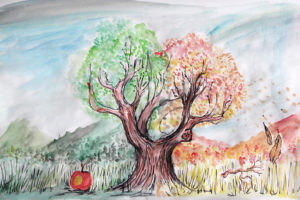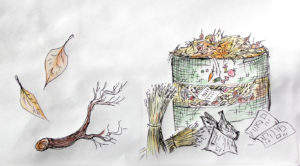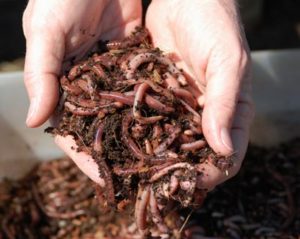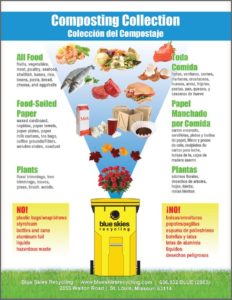Science of composting in simple terms – Compostul pe înțelesul tuturor
Composting
Have you ever heard about composting? No… well let me tell you what it is.
In the simplest terms it’s a cycle of life. Organic matters are naturally decomposed in a process called composting. This process recycles various organic materials or waste products and produces a soil conditioner (the compost).

Simpler? A tree or a vegetable, maybe a fruit will grow, fall on the ground and most likely by next year same time will turn into dirt – and not just simple dirt, it will be highly nutritious dirt, extremely good for plants to grow. So living things (plants and such) are with time becoming hummus (a really good dirt for plants), and if you gather it pile in order to get hummus, you can call it composting.
Now to business. Composting is highly recommended in agriculture. Some say that animals are the best fertiliser producers, but they are wrong: it is indeed good, but it contains a lot of acid so you need wait a few weeks or even months before using it as a compost. And not even mentioning the smell. So, a better, less smelly way to compost is to start a compost pile. It is easy and if done RIGHT it will not smell at all! Also on the benefits side: in some cases it takes only 2 weeks before getting good and usable compost (awesome right?).
What do you need for it?
Not much: you need space (depending how big is the compost pile).
Also you need food leftovers, as these will be the things you want to get rid of and turning it in green stuff, known as a nutrition for compost.
Another thing you need is referred to as brown stuff, that means old wood or paper, leaves that have turned to brown or old grass that is already brown. Brown stuff is a building block for composting.
Lastly it needs some air and water. These are quite important things for compost. Since composting is a chemical reaction between brown and green stuff, if it does not get enough of air it will create a lot of gas (and yes it smells). Also with reaction like this compost piles can become hot and I mean REALLY hot. (Ever heard a compliment “wow you are hotter than a compost pile”? ) There are cases where dry compost piles have thought on fire, since in summer, a good compost pile has steady degrees of 60 C, and if it is not touched in long time it can grow to about 80 degrees C easily.
Not to scare you, but no – the facts are not from some sort of science fiction movie, they are real.
OK, lets start with a compost pile.
 step 1: find a place in the shade on the middle of the day. In my home I have 1m diameter of fence circle, on the shade of a apple tree.
step 1: find a place in the shade on the middle of the day. In my home I have 1m diameter of fence circle, on the shade of a apple tree.
step 2: start a kind of sandwich with brown stuff and green stuff. A compost pile is composed from 80% of brown stuff and 20%green stuff. Just imagine a sandwich from this and try to build one … you but a bit of brown stuff and add 1/4th of green stuff, on top of that again brown stuff, added 1/4 green stuff and so on. Some tips would be also try to always end with brown stuff so it would not attract animals or flies (also it will prevent it from smelling)
Taking care of a compost pile
General rule is – if it smells you messed it up. That means it might not have enough of air, or too much of green stuff, meaning not enough of brown stuff to decompose that smelly green stuff. Maybe your compost pile is black? That means its overheating and you need to stir it. Yes its best to stir your compost pile once a week so it would not over heat and maybe to take that precious nutrition rich dirt that your plants grave for so so so so much.
Urban compost
But wait! What if you live in a city and want to compost at home? There is an soulution. All yo u need is a bucket, green stuff (some food leftovers), a bit of brown stuff (a old news paper will do), some water and some WORMS. But not any worms: you need a handful of worms from special species and you problem is solved (for example red wigglers are most popular). These compost worms are awesome, they speed up composting remarkably and as result you can collect worm juice. All that these guys are doing is eating, reproducing and leaving behind their poo, so juice is actually their pee, one of the most powerful organic fertilisers. You have to mix it with water though, 10:1 for not killing the plant itself, as it it very concentrated.
u need is a bucket, green stuff (some food leftovers), a bit of brown stuff (a old news paper will do), some water and some WORMS. But not any worms: you need a handful of worms from special species and you problem is solved (for example red wigglers are most popular). These compost worms are awesome, they speed up composting remarkably and as result you can collect worm juice. All that these guys are doing is eating, reproducing and leaving behind their poo, so juice is actually their pee, one of the most powerful organic fertilisers. You have to mix it with water though, 10:1 for not killing the plant itself, as it it very concentrated.
So, when composting in the city all you need to do is to water the little guys, feed them every once in a while, have a bit of time to time gather the compost and juice, and ooh – make sure that they will not get direct sunlight as this is what kills them.
Yes and no in a compost pile
YES
- organic materials like leaves, grass, and food scraps (not oily!)
- newspapers (most inks used in newspapers are not toxic)

- tree bark
- all fruits and vegetables (including citruses)
- vegetable and fruit peels and ends
- coffee grounds and filters
- tea bags (even those with high tannin levels)
- grains such as bread, cracker and cereal (including moldy and stale)
- eggshells (rinsed)
- leaves and grass clippings (not sprayed with pesticides)
- paper towels (which has not been used with cleaners or chemicals)
NO
- meat and bones
- non organic waste as plastic
- oily materials
Compost
Ai auzit de compost? Nu… atunci dă-mi voie să îți spun ce este.
Pe scurt, este ciclul vieții. Materiile organice se descompun natural într-un proces numit compostare. Procesul reciclează variate materii organice sau resturi de produse și face un îngrășământ pentru sol (compost).
Mai simplu? Un copac ori o legumă, ori chiar un fruct va crește, va cădea pe pământ și până la anul va fi transformat în sol – și nu simplu sol, ci un sol cu proprietăți nutritive, extrem de bun pentru creșterea plantelor. Prin urmare ființele vii (plante și altele) se transformă în timp în humus (o materie foarte bună pentru plante), iar când aduni o astfel de grămadă de humus poți să o numești compost.
Compostul este foarte recomandat în agricultură. Unii zic că animalele sunt cei mai buni fertilizatori, dar se înșeală: sunt buni întradevăr, dar conțin mult acid, deci trebuie să aștepți câteva săptămâni sau chiar luni pentru a le folosi resturile ca și compost. Și să nu mai vorbim de miros. Un mod bun, mai puțin mirositor de a face compost este să faci o grămadă de compost. E ușor și dacă e făcut CORECT nu va mirosi deloc! Printre beneficii: în unele cazuri durează doar 2 săptămâni pentru a avea compost bun de folosit (minunat, nu?).
De ce ai nevoie?
Nu foarte multe: spațiu (depinde cât de mare e grămada de compost). Și mai ai nevoie de resturi alimentare, că astea sunt cele de care vrei să scapi, sunt chestiile verzi pe care le transformi în resurse pentru compost. Și mai ai nevoie de chestii maro, lemn vechi sau hârtie, frunze sau iarbă maro deja. Acestea sunt baza compostului.
Și în cele din urmă ai nevoie de aer și apă. Și astea sunt destul de importante pentru compost. Din moment ce compostarea este o reacție chimică între materiile maro și cele verzi. Dacă nu are suficient aer se vor crea gaze (și va mirosi). Totodată în reacțiile dintr-o grămadă de compost poate deveni foarte fierbinte. (Ai auzit vreodată de complimentul “ești mai fierbinte decât o grămadă de compost”?). Au fost cazuri în care grămezi uscate de compost au luat foc, căci pe timp de vară, o grămadă de compost are o temperatură constantă de 60 grade C și dacă nu este atinsă o perioadă poate ajunge la 80, cu ușurință.
Nu intenționez să te sperii, dar astea sunt fapte reale și nu filme science fiction.
OK, să facem o grămadă de compost.
Pasul 1: găsește un loc care e la umbră în miezul zilei. Acasă am un spațiu de 1 metru diametru îngrădit cu un gard, sub un măr.
Pasul 2: fă un sandviș cu materii maro și verzi. O grămadă de compost are 80% materii maro și 20% materii verzi. Imaginează-ți un sandviș din astea și fă unul. Deci materii maro și 1/4 materii verzi și apoi din nou maro și din nou versi. Un sfat, încheie cu materii maro, ca să nu atragi animale sau muște și pentru a nu mirosi.
Îngrijirea unei grămezi de compost
Regulă generală – dacă miroase ceva a mers prost. Adică ori nu a avut suficient aer, ori prea multe materii verzi și prea puține maro în care să se descompună. Poate grămada ta de compost e neagră? Asta înseamnă că s-a supraîncălzit și trebuie să o amesteci. Da, e bine să amesteci grămada de compost o dată pe săptămână, pentru a nu se încăzi prea tare și a distruge elementele nutriționale de care plantele tale au nevoie.
Compost urban
Dar stai! Dacă locuiești într-un oraș și vrei să faci compost? Există o soluție. Tot ce ai nevoie este o găleată, materii verzi (resturi alimentare), ceva materii maro (ziare vechi) niște apă și ceva viermi: ai nevoie de o mână de viermi dintr-o specie specială și problema ta este rezolvată (râmele sunt cele mai populare). Acești viermi pentru compost sunt minunați, ei grăbind procesul de compostare și ca rezultat poți aduna și un fel de suc. Tot ce fac vermii ăștia este să mănânce, să se reproducă și să lase în urma lor fecale și urină, urina fiind unul dintre cele mai puternice fertilizatoare. Totuși trebuie să o amesteci cu apă în proporție de 10:1, dacă nu vrei să distrugi plantele.
Deci, când faci compost în oraș nu trebuie decât să le dai apă acestori viermi și să îi hrănești din când în când, apoi să aduni compostul și sucul și să te asiguri că nu ajung în lumina directă a soarelui, căci îi va ucide.
Ce să pui și să nu pui în grămada de compost
DA
- materii organice precum frunze, iarbă și coji de fructe (care nu sunt uleioase)
- ziare (majoritatea cernelurilor nu sunt toxice)

- scoarță de copac
- fructe și legume (incluzând citrice)
- coji și cotoare de fructe și legume
- zaț de cafea și filtre
- pliculețe de ceai (chiar și cele cu conținut ridicat de tanin)
- produse de panificație, pâine, biscuiți, cereale (inclusiv cele mucegăite și învechite
- coji de ouă (clătite)
- resturi de iarbă și frunze (care nu au fost ierbicidate)
- prosoape de hârtie (care nu au fost folosite împreună cu chimicale)
NU
- caren și oase
- resturi non-organice (plastic de exemplu)
- materii uleioase
Raimo este în România pentru o perioadă de șapte luni, din mai 2018 până în noiembrie 2018, în cadrul proiectului Building Youth supportive Communities – Environment [2017-2-RO01-KA105-037748] proiect co-finanțat de Uniunea Europeană prin Programul Erasmus+ și implementat în România de către Curba de Cultură.
About the author